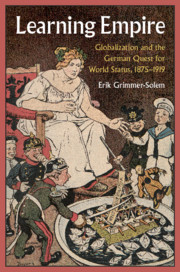Book contents
1 - Frontier Empire
The United States
from Part I - Absent-Minded Empire, 1875–1897
Published online by Cambridge University Press: 20 September 2019
Summary
This chapter explores how profoundly German perceptions of itself as a new industrial and aspiring colonial power were shaped by the United States, yet also how those perceptions changed as the United States came to be seen as a potential threat to Germany for the first time. After completing their studies under Gustav Schmoller in the late 1870s and investigating conditions in United States, Max Sering and Henry Farnam published works that shaped perceptions of the American frontier in Germany as a force defusing working class radicalism and as a distinctly colonial land of opportunity and upward mobility, animating German ambitions for overseas settler colonies and contiguous colonies in the Prussian east. Later in the 1890s Hermann Schumacher and Ernst von Halle were exposed to Sering and Schmoller’s teaching at Berlin University, travelling to the United States to investigate industrial trusts, cotton growing, and the American grain market during a time of growing American nativism, protectionism, and trustification.
Keywords
- Type
- Chapter
- Information
- Learning EmpireGlobalization and the German Quest for World Status, 1875–1919, pp. 29 - 78Publisher: Cambridge University PressPrint publication year: 2019
- 2
- Cited by

